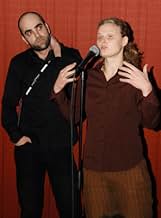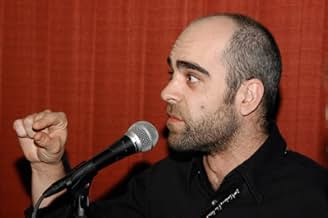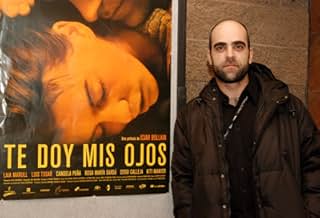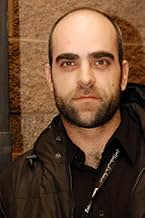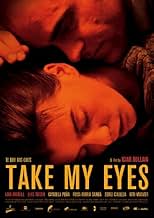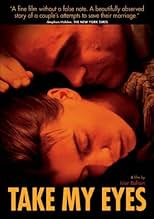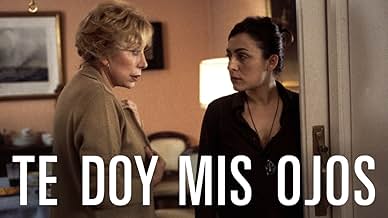CALIFICACIÓN DE IMDb
7.4/10
7.8 k
TU CALIFICACIÓN
Pilar huye de casa una noche de invierno. Solo se lleva con ella unas pocas pertenencias y a su hijo, Juan. Antonio no tarda en empezar a buscarla. Dice que Pilar es su sol y que, además, le... Leer todoPilar huye de casa una noche de invierno. Solo se lleva con ella unas pocas pertenencias y a su hijo, Juan. Antonio no tarda en empezar a buscarla. Dice que Pilar es su sol y que, además, le ha dado sus ojos.Pilar huye de casa una noche de invierno. Solo se lleva con ella unas pocas pertenencias y a su hijo, Juan. Antonio no tarda en empezar a buscarla. Dice que Pilar es su sol y que, además, le ha dado sus ojos.
- Dirección
- Guionistas
- Elenco
- Premios
- 42 premios ganados y 17 nominaciones en total
Rosa Maria Sardà
- Aurora
- (as Rosa María Sardá)
Kiti Mánver
- Rosa
- (as Kiti Manver)
David Mooney
- John
- (as Dave Mooney)
- Dirección
- Guionistas
- Todo el elenco y el equipo
- Producción, taquilla y más en IMDbPro
Opiniones destacadas
The best I can say in favor of this film is that I came out of the cinema with terrible back pain because I had been so extremely tense while watching it. The actors are absolutely brilliant, communicating all that needs to be told, and the plot is never simplistic.
Most European social cinema seems influenced by Ken Loach's movies and this one is no exception. The way time passes slowly and characters try hard to improve their situation reminds a lot of Loach's "Sweet Sixteen", among others.
If there is any weakness to the movie is that I can't say if people who do not share the director's opinions on gender violence would appreciate this movie as much as I have.
Most European social cinema seems influenced by Ken Loach's movies and this one is no exception. The way time passes slowly and characters try hard to improve their situation reminds a lot of Loach's "Sweet Sixteen", among others.
If there is any weakness to the movie is that I can't say if people who do not share the director's opinions on gender violence would appreciate this movie as much as I have.
Writer-director Iciar Bollaín's film, TAKE MY EYES (Spain 2003) is full of boldness and nuance, approaching 'full frontal' (almost a pun here) the delicate 'taboo' subject on spouse abuse in love and marriage. The exceptionally talented and selfless portrayal of the couple by Laia Marull as Pilar (the young wife/mother) and Luis Tosa as Antonio (the husband/abuser) made their scenes together - both the tender moments and violent events, convincing and complete. It's heartbreaking to see these two people who could be so in love (felt through the intimate lovemaking scenes, the calm moments they enjoy each other by the river) yet juxtaposed by the traumatic turn of events (seen through the 'explosive' frightful situations). Bollaín, with Marull and Tosa, did not shy away from the volatile subject and key scenes - it is no doubt devastating to behold yet the impact of the situation is truly felt and may also leave us shaking. Kudos to such giving and fearless performances and production decisions.
The Toledo, Spain, locales (especially by the river and bridge) seen in the film are as beautiful as I visited in Fall 2003. I remember the museum where Antonio waited outside for Pilar. He tried. He wanted to be a loving husband to her, but he couldn't help himself. It almost seem like uncontrollable 'alcoholic dependency', his jealous rage generated from fear of losing Pilar, whom he believes he loves in his own possessive ways. While Pilar also tries. She practically loses herself in trying to please Antonio and be 'blinded' by his waves of tenderness towards her. She's struggling to be a good wife and responsible mother to their little boy. She's also trying to find herself through the process.
I recall the wisdom from poet Kahlil Gibran's book "The Prophet" on Marriage: yes, you shall be together forever more, but there should be spaces in your togetherness. "Give your hearts, but not into each other's keeping. For only the hand of Life can contain your hearts." And on Love, that it does not possesses, Gibran said: "And think not you can direct the course of love, for love, if it finds you worthy, directs your course."
TAKE MY EYES gives us a rare chance to observe closely the various aspects/perspectives of a domestic violence situation, and offering viable option on the part of the woman. It may not be an easy film to watch due to frank emotional depiction, but it is superbly delivered by a fantastic cast besides Marull and Tosa. The script, co-written by Bollaín and Alicia Luna, contains supporting storyline (including a wedding and Scottish bagpipes and kilts - cultural diversity, girl talk, men talk, laughs and heartaches). Production is excellent in every respect: cinematography, editing, art direction, music score, sound and all. Highly recommend this film, with no hesitation.
The Toledo, Spain, locales (especially by the river and bridge) seen in the film are as beautiful as I visited in Fall 2003. I remember the museum where Antonio waited outside for Pilar. He tried. He wanted to be a loving husband to her, but he couldn't help himself. It almost seem like uncontrollable 'alcoholic dependency', his jealous rage generated from fear of losing Pilar, whom he believes he loves in his own possessive ways. While Pilar also tries. She practically loses herself in trying to please Antonio and be 'blinded' by his waves of tenderness towards her. She's struggling to be a good wife and responsible mother to their little boy. She's also trying to find herself through the process.
I recall the wisdom from poet Kahlil Gibran's book "The Prophet" on Marriage: yes, you shall be together forever more, but there should be spaces in your togetherness. "Give your hearts, but not into each other's keeping. For only the hand of Life can contain your hearts." And on Love, that it does not possesses, Gibran said: "And think not you can direct the course of love, for love, if it finds you worthy, directs your course."
TAKE MY EYES gives us a rare chance to observe closely the various aspects/perspectives of a domestic violence situation, and offering viable option on the part of the woman. It may not be an easy film to watch due to frank emotional depiction, but it is superbly delivered by a fantastic cast besides Marull and Tosa. The script, co-written by Bollaín and Alicia Luna, contains supporting storyline (including a wedding and Scottish bagpipes and kilts - cultural diversity, girl talk, men talk, laughs and heartaches). Production is excellent in every respect: cinematography, editing, art direction, music score, sound and all. Highly recommend this film, with no hesitation.
8Nzup
There are for sure many other films dealing with domestic violence, but I bet no one is better than this one.
This is something that is said to happen quite often in Spain and the movie was shot in order to sensitize people for this issue and to bring to talk about it. It is the story of an ill jealous man, full of complex of inferiority, terrorizing his wife and son.
I loved the love scene between both, where he makes her repeat that she gives all her body to him (Te doy mis ojos, te doy mi boca etc.). It shows perfectly the mental state of the husband who sees his wife as his property.
This was as well an excellent performance of Laia Marull and Luis Tosar.
This is something that is said to happen quite often in Spain and the movie was shot in order to sensitize people for this issue and to bring to talk about it. It is the story of an ill jealous man, full of complex of inferiority, terrorizing his wife and son.
I loved the love scene between both, where he makes her repeat that she gives all her body to him (Te doy mis ojos, te doy mi boca etc.). It shows perfectly the mental state of the husband who sees his wife as his property.
This was as well an excellent performance of Laia Marull and Luis Tosar.
This movie takes a brutally honest approach at the tragic reality of spousal abuse. This topic has been addressed before, but this movie deals with the subject matter better than any other I can recall seeing.
An effective performance by Luis Tosar, as the abusive husband Antonio, develops the layers of emotions in this imposing and frightening character in an effort to understand why this violence is occurring. While certainly not presenting an advocate's position to defend his cruel and vicious behavior, the film also resists the temptation of exploiting the volatile outbreaks. The film shows degrading speech and physical battery to the wife, while not going overboard with bloody, gory attack just for their own sake. He attends support groups to discuss with a psychologist and other abusers the root causes of the action, and makes a sincere effort to change his ways. Gradually, the motivations for his irrational action, although becoming clearly understood, are still properly advanced as totally unacceptable.
Laia Marull, as the abused wife, is not stereotyped, either. She is shown as an intelligent and capable person, making an honest effort to confront the situation, while struggling with the conflict of somehow preserving the marriage. There are many artistic metaphors about the passion of their marriage reflecting the very problem they are dealing with. I also like the wife's museum tour presentations, where she is clearly talking not only of the paintings, but of her own aspirations. Both of the principals are splendid in their roles, especially in their interaction with one another.
Much could be written of the rich double-layered symbolism of several other scenes. Suffice it to say this is a beautifully done movie with an ending, that in all its simplicity, took me by surprise. It was the proper ending, too, I think, for reasons you will understand when you see the movie. Definitely worth viewing.
An effective performance by Luis Tosar, as the abusive husband Antonio, develops the layers of emotions in this imposing and frightening character in an effort to understand why this violence is occurring. While certainly not presenting an advocate's position to defend his cruel and vicious behavior, the film also resists the temptation of exploiting the volatile outbreaks. The film shows degrading speech and physical battery to the wife, while not going overboard with bloody, gory attack just for their own sake. He attends support groups to discuss with a psychologist and other abusers the root causes of the action, and makes a sincere effort to change his ways. Gradually, the motivations for his irrational action, although becoming clearly understood, are still properly advanced as totally unacceptable.
Laia Marull, as the abused wife, is not stereotyped, either. She is shown as an intelligent and capable person, making an honest effort to confront the situation, while struggling with the conflict of somehow preserving the marriage. There are many artistic metaphors about the passion of their marriage reflecting the very problem they are dealing with. I also like the wife's museum tour presentations, where she is clearly talking not only of the paintings, but of her own aspirations. Both of the principals are splendid in their roles, especially in their interaction with one another.
Much could be written of the rich double-layered symbolism of several other scenes. Suffice it to say this is a beautifully done movie with an ending, that in all its simplicity, took me by surprise. It was the proper ending, too, I think, for reasons you will understand when you see the movie. Definitely worth viewing.
This is an excellent movie that understands the complexity of domestic violence. I am an advocate for survivors of domestic violence and we know that partner abuse is much more than a black eye. During the movie there is only one episode of physical violence, however we can observe throughout the movie the dynamics of power and control by the husband, through emotional, verbal, and other types of abuse. The person who wrote the previous message shows a complete lack of understanding about the impact that domestic violence has on the victim, why it is so difficult to break with cycle, the challenges that women face when they try to leave (including the fear of retaliation). Don't forget that 75% of women killed by their partners were murdered after they left the relationship. By leaving, women are taking a great risk. I think this movie is very realistic and the actors do a great job. I highly recommend it.
¿Sabías que…?
- TriviaLaia Marull said her role in this film is the one that has marked her career the most. "It was a very intense movie. I remember the scene in which my character is undressed by his partner and urinates on the balcony. It was a very emotional scene. Working with Luis Tosar is very easy because you look into his eyes and he gives you everything," Marull said. For his part, Tosar revealed a secret about that scene: "When we filmed the scene on the balcony, in which she pees on herself out of fear, I remember being with a sponge between her legs, helping her squeeze it so that the trickle would fall out."
- ConexionesReferenced in Spanish Movie (2009)
- Bandas sonorasFarewell To Gibraltar
Canción popular escocesa
Selecciones populares
Inicia sesión para calificar y agrega a la lista de videos para obtener recomendaciones personalizadas
- How long is Take My Eyes?Con tecnología de Alexa
Detalles
- Fecha de lanzamiento
- País de origen
- Sitio oficial
- Idioma
- También se conoce como
- Take My Eyes
- Locaciones de filmación
- Productoras
- Ver más créditos de la compañía en IMDbPro
Taquilla
- Total en EE. UU. y Canadá
- USD 30,496
- Fin de semana de estreno en EE. UU. y Canadá
- USD 6,440
- 19 mar 2006
- Total a nivel mundial
- USD 6,098,633
- Tiempo de ejecución
- 1h 49min(109 min)
- Color
- Mezcla de sonido
- Relación de aspecto
- 1.85 : 1
Contribuir a esta página
Sugiere una edición o agrega el contenido que falta

![Tráiler [OVS]](https://m.media-amazon.com/images/M/MV5BNDFiNzRhYTMtODVmNy00OWQ0LTkwMzAtYjRiNGZmNTk4YjhhXkEyXkFqcGdeQXRyYW5zY29kZS13b3JrZmxvdw@@._V1_QL75_UX500_CR0)
